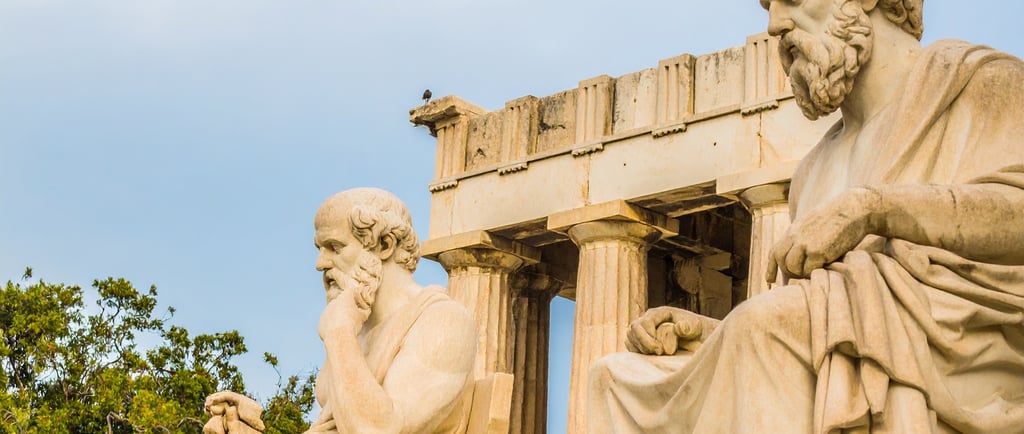UPSC Mains Comment: "Until philosophers are kings, or kings and princes of this world have the spirit and power of philosophy, cities will never have rest from evil." (2000)
Plato’s Republic presents a bold claim: Only philosophers should rule. But is that wisdom or authoritarianism? This post explores Plato’s philosopher-king theory—its epistemological roots, soul-state analogy, and its evolution through Aristotle, modern liberals, technocrats, and Indian thinkers like Ambedkar and Gandhi. A must-read to understand the timeless debate between knowledge and power, idealism vs democracy, and whether wisdom still has a place in political leadership today.
PSIR
7/29/20252 min read


Plato’s philosopher-king proposition presents a foundational debate in political theory—should those who understand justice (philosophers) also hold political power? His model integrates intellectual virtue with political authority, challenging the modern separation between wisdom and governance.
🏛️ Plato’s Theoretical Framework
📚 1. Epistemological Roots: The Allegory of the Cave & Theory of Forms
Plato distinguishes between:
Doxa (opinion) – held by the masses
Episteme (true knowledge) – held by philosophers
Philosopher-kings escape the “cave” of illusion and perceive the Form of Justice, making them uniquely qualified to rule.
💡 2. The Tripartite Soul & State Analogy
Plato compares the soul’s parts to social classes:
Reason → Rulers (Philosopher-Kings)
Spirit → Auxiliaries (Warriors)
Appetite → Producers (Farmers, Artisans)
🧩 Justice, for Plato, is achieved when each part performs its role under the guidance of reason—both in the soul and in the state.
⚖️ Classical and Modern Critiques
🏺 1. Aristotle’s Challenge: Phronesis vs Sophia
Aristotle argued:
Sophia (theoretical wisdom) is not enough.
Phronesis (practical wisdom) is essential for governance.
He emphasized context, experience, and human variability—laying the ground for empirical politics.
🌐 2. Modern Liberal Critique
J.S. Mill warned of enlightened despotism overriding liberty.
Isaiah Berlin feared that philosopher-kings might force people to be “free” against their will (positive liberty gone wrong).
🔍 Core critique: Concentration of power + certainty of truth = threat to individual freedom
📈 Contemporary Relevance
🛠️ 1. Technocracy & Modern States
Plato’s vision echoes in:
Singapore under Lee Kuan Yew – technocratic, efficient, elite-led development
China’s meritocratic system – selecting leaders based on knowledge and virtue
⚠️ Critique: These systems offer results but often lack democratic accountability.
📊 2. Epistocracy & Deliberative Democracy
Jason Brennan: Advocates epistocracy (rule by the knowledgeable) to improve decision-making quality.
Jürgen Habermas: Supports deliberative democracy, where rational discourse shapes decisions.
These are modern variations on Plato’s central concern: Can uninformed masses make wise decisions?
🧭 3. Moral Expertise Debate
Martha Nussbaum: Philosophy can enhance ethical citizenship.
Bernard Williams: Ethics alone can’t substitute for practical political judgment.
⚖️ Ongoing debate: Is intellectual wisdom equal to political wisdom?
🇮🇳 Indian Context: Echoes and Alternatives
📜 1. Platonic Themes in Indian Constitution
Supreme Court, EC, CAG: Bodies rooted in expertise, beyond daily politics
Ambedkar’s Constitutional Morality: Need for an enlightened elite to uphold democracy
Directive Principles: Ideal philosophical goals guiding practical governance
🧘 2. Gandhi’s Alternative: Ethical Leadership, Not Authoritarian Wisdom
Gandhi rejected state power as the vehicle for moral change.
Through Satyagraha, he promoted ethical leadership by example, not control.
🕊️ Philosophy in politics, yes—but rooted in non-violence, decentralization, and moral persuasion.
🧩 Conclusion:
Plato’s idea of philosopher-kings raises timeless questions about:
Who should rule?
What qualifies someone to govern?
Can truth and power co-exist without oppression?
Modern democracies have rejected Plato’s rigid hierarchy, but his core concern—uninformed leadership vs wise rule—remains relevant in a world of fake news, populism, and technocracy.
🗣️ The debate continues—not whether philosophers should rule, but how we can make rulers think like philosophers.